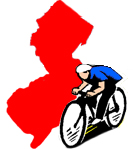1.� What is "randonneuring?"
Randonneuring is unsupported, long-distance cycling.� This style of riding is non-competitive in nature, and self-sufficiency is paramount.� When riders participate in randonneuring events, they are part of a long tradition that goes back to the beginning of the sport of cycling in France and Italy.� Friendly camaraderie, not competition, is the hallmark of randonneuring.� (from the Randonneurs USA website: www.rusa.org)
2.� What is a "brevet?"
This is a French word that means "certificate" or "diploma."� A brevet, also sometimes called a "randonnee," is the event randonneurs often enter.� This is almost always a ride of 200 kilometers or more.� Riders completing brevets of 200, 300, 400 and 600 kilometers are said to have completed a "full brevet series."� Brevets have a time limit for each distance.� For example, the typical limit for the entry-level brevet, the 200k, is 13 hours, 30 minutes.
3.� What is a "brevet card?"
This term is actually redundant, given that "brevet" can mean "certificate" in French.� The brevet card is given to each entrant in a brevet and it must be filled out at each controle along the route.� Riders cannot receive official credit for finishing a brevet, without a signed and completed brevet card.� Keep it in a safe place (not in your jersey pocket!)
4.� What is a "controle?"
A controle is a kind of checkpoint along a brevet course.� At each controle, riders must add certain information to their brevet card.� At a manned controle, the volunteer will sign the card.� At an unmanned controle, the rider may have to have a store owner sign it.� At an information controle, the rider may have to answer a question related to the controle.� Often, though not always, there is food and drink at a controle.
5.� What is the RUSA and why should I care?
RUSA stands for Randonneurs USA, the national organization set up to promote randonneuring in the U.S. and assist American randonneurs.� RUSA issues memberships to American randonneurs, but does not organize rides.� It delegates the organization of rides to Regional Brevet Administrators ("RBA") and bicycle clubs all over the country.� RUSA also frequently serves as the liason between RBAs and the Audax Club Parisien.� You need to join RUSA if you want to qualify for the 1200km Paris-Brest-Paris ride.�
6.� What is the ACP and why should I care?
The ACP is the Audax Club Parisien.� It has an illustrious history.� It was founded in 1904 by Henri Desgranges, who founded the Tour de France the year before.� The ACP runs the most famous randonneuring event of all, Paris-Brest-Paris and works with randonneuring organizations in dozens of countries around the world.
7.� What is PBP?
PBP stands for Paris-Brest-Paris, a 1200km ride that began as a race in 1891 (twelve years before the Tour de France started) and continues as the world's premier randonneuring event.� To have completed PBP within the 90-hour time limit is perhaps the most coveted honor in our sport.� PBP will next be held in August 2007.� To qualify, you must complete a full brevet series of 200, 300, 400 and 600 kilometers within the cutoff date of June 17, 2007.� You must join RUSA before entering any of those qualifying rides.
8.� What equipment do I need for riding brevets?
People complete brevets on many different kinds of bicycles, including recumbents and mountain bikes, though standard road bikes predominate.� Nearly all brevets require front and rear lighting.� Anyone who has ridden a bicycle for long distances knows how important the saddle is to a rider's comfort.
9.� How can I possibly ride enough miles to train for such long events?
The Chinese philosopher known as Lao Tzu said that a journey of 1,000 miles begins with a single step.� Worrying about finishing a 1200 km ride before ever attempting a 200km one is not wise.� If you can train for a century, you can prepare yourself for a 200k, which is just a century plus 25 miles.� The brevet series itself helps train you for progressively longer distances of 300, 400 and 600 kilometers.
10.� If I am not a fast rider, will I be able to complete brevets on time?
Anyone who has completed the longer brevets (say 400km or longer) knows that mental strength often prevails over physical strength.� There are plenty of faster riders who can't finish longer brevets and plenty of slower ones who can.� The brevets are generally set up so that if you can average 10 mph, including stops, you'll make it every time.� So the less time you stop, the slower you need to ride. Smart planning sometimes beats strong legs.
� |

